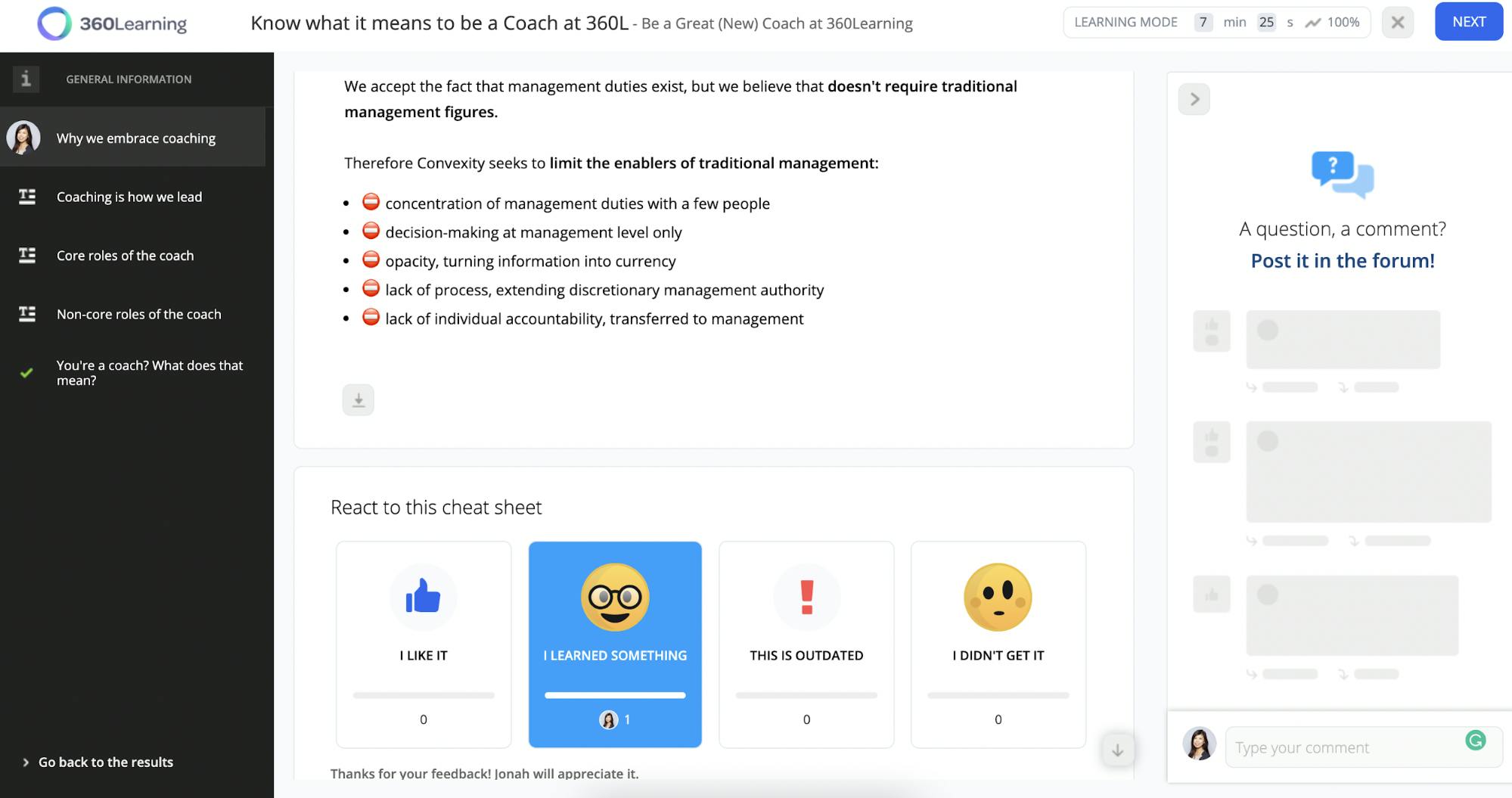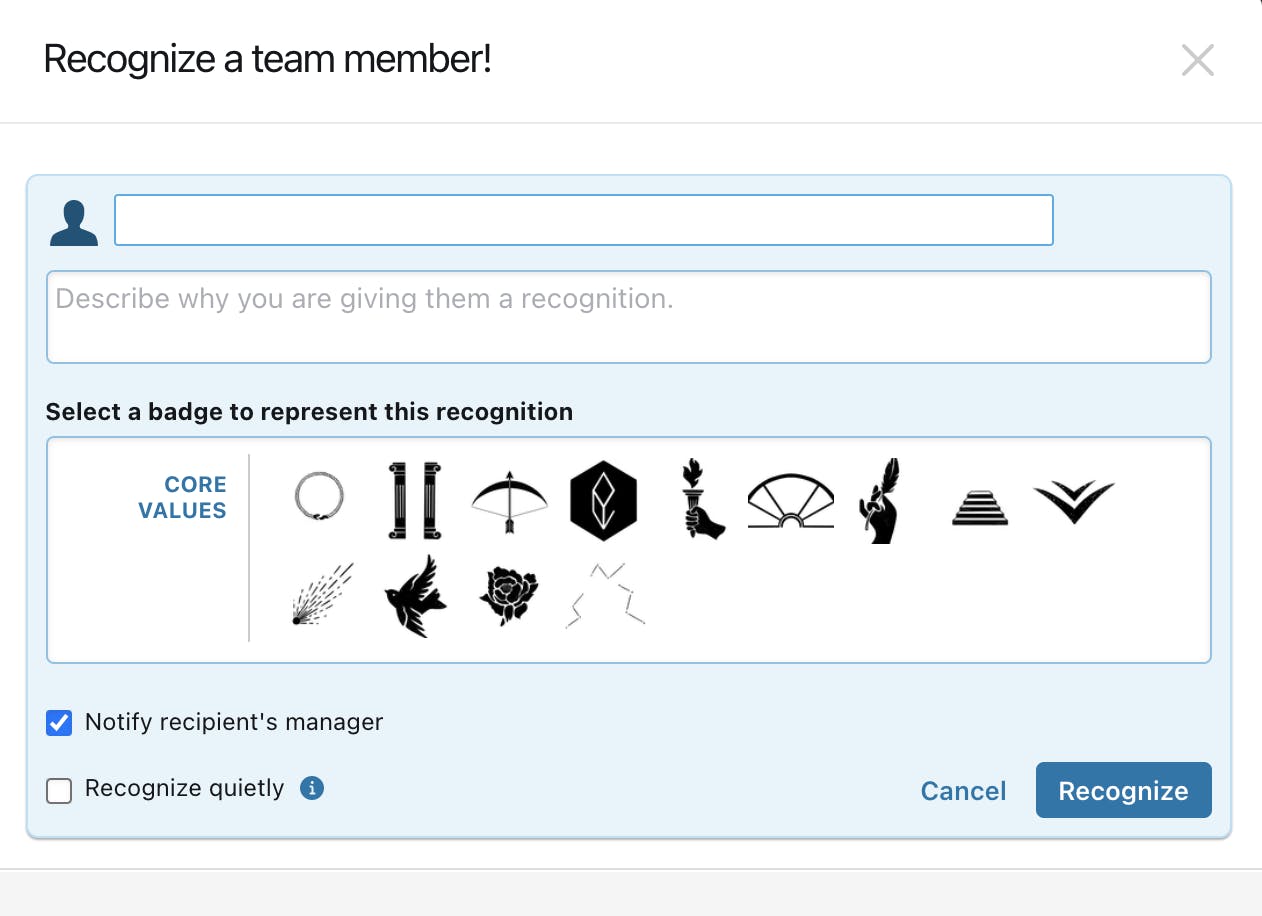
Classic Management Training is Failing Your Employees—Here’s What They Need Instead
According to Gallup's State of the American Manager report, one in two employees has left a job to get away from a bad manager. This poor leadership has far-reaching effects on a business, from increased absenteeism to decreased performance, customer ratings, and overall profits.
Clearly, it pays to train your managers well.
And yet, a surprising number of companies don’t invest in their leaders. Instead, they fall back on traditional training programs that fail new managers—especially those managing for the first time in a remote work context.
Employees need better management training—training that focuses more on people and culture, and is delivered in formats that are effective for learners. We’ll show you what this means in practice and share tips for applying the right kind of manager training.
Why good manager training is essential
Let’s play devil’s advocate and ask the obvious question: is manager training really that important? Absolutely.
Management matters
Make no mistake, poor management causes a range of company ailments. According to the Society for Human Resource Management (SHRM), aside from outward signs like declining revenue, major churn, and a falling stock price, poor management manifests in less obvious ways:
- High employee turnover
- Poor project management
- A management team that doesn’t face facts
- Reticence to new ideas
- Managers only focusing on the negative
- A company focusing on the wrong metrics
If you don’t have talented managers your team responds well to, you’re going to feel it across the entire business.
Good managers are hard to find
Unfortunately, good managers aren’t a dime a dozen.
In fact, Gallup found that only 10% of employees naturally have the tools and skills to be great leaders. What’s worse? They also found that companies fail to promote the right person 82% of the time. Far too often, companies promote individual contributors based on their performance metrics—not the soft skills essential for good management.
That’s why it’s critical to identify, encourage, and train the employees that show promising leadership skills from the get-go. You won’t just avoid problems, you’ll increase performance.
Great managers have an impact
When companies do invest in the right people with the right training, great managers are born.
- Match the right people in the right roles
- Enable accountability
- Engage employees
- Motivate each individual employee
- Coach and bring out individuals’ strengths
- Make decisions based on productivity, not politics
- Build trust and enable dialogue about work and non-work issues
Your employees, upper management, and bottom line all benefit. But even promising would-be managers need guidance. Management training is a crucial component of nurturing prime candidates and ensuring they live up to their managerial potential.
However, as we mentioned earlier, traditional manager training isn’t doing them justice.
What most classic management training does wrong
A shockingly high number of managers don’t get training—or at least, not enough—before they’re thrown into their role. But even when they do receive manager training, it often falls short in the following ways:
1. It’s too long (and in-person)
Classic management training is conducted synchronously, in person, often in a workshop format. It’s long and includes dense lectures that aren’t as engaging or effective as they could be.
2. Too broad and generic
Traditional management training deals in platitudes and generalities that aren’t specific to your up-and-coming manager’s contextual challenges. It’s too generic to be of much use.
3. No proper accompaniment or accountability
Too often, new managers get their one-off training—and are then left to fend for themselves. There’s no follow-up to see if the training was effective, and nobody holds new managers accountable for their progress.
This kind of lackluster training is even more harmful during these pandemic times, when management is complicated by remote working. There is definitely a better way.
How manager training should look like (for remote teams)
If you’re serious about preparing promoted managers for their new responsibilities, this is what their manager training should look like:
Asynchronous yet collaborative
At 360Learning, we’re firm believers in the benefits of collaborative, asynchronous learning. When we train our own new managers, we provide programs that can be consumed at the learner’s convenience:
- New managers (coaches) can learn on their own time (in the flow of work)
- But also interact with a community of other new managers to ask for advice, troubleshoot questions, and share experiences
This blends the best of both worlds: convenience and interactivity.

Outline expected behaviors clearly
What can help learners home in on exactly what’s expected of them as managers? Modeling behavior and outlining expectations. We use the pillars of our company culture—Convexity—to do this. During manager training, we focus on:
- Transparency: Managers should model and facilitate transparency around communication, expectations, performance, feedback...
- Scopes: Managers should clearly define their team’s scopes, and work with them to set OKRs that reflect this. In a remote setting, this helps reduce confusion and redundancy.
- Rational Thinking: Managers are expected to communicate using the pyramid principle (starting with the conclusion and succinctly supporting that conclusion), and encourage their team to do the same. Clear, concise writing is key when teams are working 100% remotely.
To help ensure our new managers are getting what we need, we don’t stop there—we follow up with personalized coaching.
Offer coaching and encourage accountability
One-to-one coaching gives new managers the chance to work on areas of improvement, seek guidance, and stay motivated. We also provide the entire company with opportunities to give feedback, to keep new managers accountable, but also recognize their efforts.
- Company-wide feedback polls like Peakon open up channels of communication
- Tools like 7Geese provide avenues for public praise

Regular use of these tools helps fill in the gaps made by reduced in-person communication.
Related: Onboarding, Ramp-Up, and Beyond: What You Can Expect From the 360Learner Journey
Good (remote) management in practice: dos and don’ts
If you're looking for good practices to include in your manager training, here are some additional ideas for how to continue to create a collaborative, safe, and productive environment for your (remote) teams.
Be transparent & human
This is a big one if you’re, say, a Baby Boomer manager working with Millennials or Gen z. Especially relevant for younger generations, “employees want undershepards, not overlords.” In other words, in work as in any other community setting, people want (appropriately) to:
- Love and be loved
- Serve and be served
- Know and be known
Treat employees as individuals and spend as much energy working on building trust and dialogue as on improving performance metrics.
Related: Training a Multigenerational Workforce is Simpler Than You Think
Go beyond updates in your 1:1s
A good way to start building that trust and dialogue is to ask the right questions in the time you have with your team. Ask open-ended questions that will:
- Open up new lines of communication and get them talking
- Make them feel valued
- Close the gap created by not seeing them in person
Create asynchronous engagement
Working remotely means more asynchronous communication by default. This kind of set-up can be challenging for some, and it helps to:
Set communication hours and expectations
Managers and individual contributors alike can easily feel swamped by pings, instant messages, Slack notifications, and emails. Set ground rules for when you’ll be doing ‘head down’ work, and when your team can expect a prompt reply. For example:
- I’m doing head-down work from 8am to 12:30pm but can answer promptly between 1pm and 4pm
- I’ll respond within 24 hours on Slack but text me if urgent
Make room for ‘fun’ communication
Working remotely makes it hard to share spontaneous moments of fun with your team. Instead, try to build those in:
- Set up a space to share pictures of pets or other lighthearted content
- Instate ‘donut Monday’ where your team brings a snack to meetings
Organize “all in” meetings to close information gaps
A recurring meeting with the entire company, office branch, or team can help everyone stay up to date. If someone can’t make it to this synchronous meeting, share a recording or make sure there are notes to pass on.
Invest in management training
The bottom line is that managers are an essential part of your organization—yet they rarely get the support they need, even in extra challenging times. Investing in the right kind of training for your newly minted leaders will benefit your business in almost every way.
For more information on how to support your teams, check out our replay webinar with Uptick on post-pandemic manager training.


